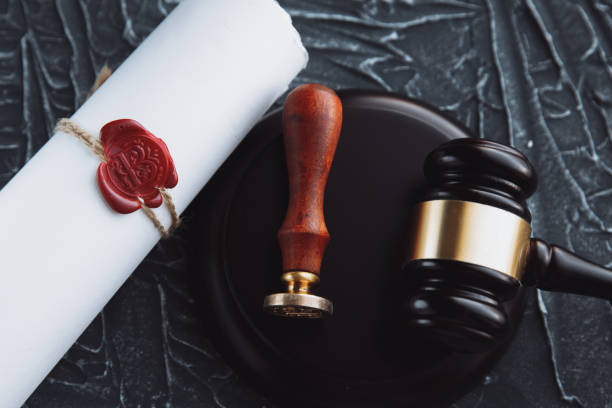From the solemnisation of marriages to the authentication of corporate documents, a notary public NSW plays a pivotal role in safeguarding the interests of individuals and organisations alike. Their expertise is particularly crucial in international transactions, where the verification of documents is paramount for ensuring the smooth flow of business.
A Notary Public in New South Wales (NSW) is a qualified lawyer that the Supreme Court appoints pursuant to the Public Notaries Act 1997 (NSW) and the Public Notaries Appointment Rules 1998. They are responsible for authenticating and certifying various documents for use both domestically and internationally.
If you are a practicing solicitor in New South Wales with a minimum of 5 years of experience, you are eligible to apply to the NSW Supreme Court to be appointed as a Notary Public. Prospective applicants must complete the Notarial Practice Course and apply through the Legal Profession Admission Board.
Rules governing the practice, administration, regulation and discipline of Notaries are very similar to the laws covering all practising solicitors. This includes the holding of compulsory professional indemnity insurance for the due protection of their clients.
Notaries perform functions such as verifying a person’s identity, authenticating documents for international purposes, witnessing signatures, and certifying true copies of documents for use overseas.
Notary Public NSW Services You May Avail
There are various types of notary public NSW services that you can avail:
1. Affidavits, Affirmations, Declarations
In NSW, Notaries Public have authorisation to notarise various types of witness documents, including Affidavits, Affirmations, and Statutory Declarations. These notarial acts are essential for legal and business purposes, and Notaries Public play a crucial role in ensuring the authenticity and integrity of the documents they notarise.
What’s the difference among the three documents?
- Affidavits – a written statement of fact that is confirmed by the oath or affirmation of the party making it before a Notary Public.
- Affirmations – an affirmation is a solemn pledge made on the signer’s personal honour, with no reference to a higher power.
The Notary Public administers the affirmation and notarises the document as required.
- Declarations – a written statement that the writer believes to be true, but it is made without the writer being sworn in. Notaries can notarise declarations by verifying the identity of the individual making the declaration and notarising the document as needed.
The fee for notarisation of affidavits, affirmations, and declarations according to the Scale of Fees recommended by the Society of Notaries of New South Wales ranges from AUD 50 to AUD 180. To check the complete list of fees, here’s the link to the Society’s website.
2. Deeds or Other Unsworn Documents
Notarising a Deed involves verifying the identity of the person signing the document and ensuring that they are signing it voluntarily.
The Notary Public then signs and seals the document, indicating that they have witnessed the signing and that the document is authentic. Other unsworn documents that can be notarised include contracts, agreements, and other legal documents.
Fee: AUD 80 to AUD 600

3. Verification of Copy Documents
Here’s what a notary public NSW may do for you:
- Preparing and completing Notarial Certificate certifying copy of one document (up to 5 pages)
- Verifying copy of official Australian Government document (e.g. Vaccination Certificate, Citizenship Certificate, Passport)
4. Notarial Certificates
Notaries Public issue notarial certificates to authenticate and certify various documents for use both domestically and internationally.
Some examples of notarial certificates and services provided by Notaries Public in NSW include:
- Certifying true copies of documents for use overseas, such as passports, driver’s licenses, birth certificates, marriage certificates, and death certificates.
- Verifying education records, qualifications, employment documents, and medical reports and prescriptions.
- Witnessing signatures of individuals to documents and authenticating identity.
- Authenticating official, government, and personal documents and information for use overseas.
- Preparing and completing notarial certificates for a wide range of documents, including deeds, powers of attorney, and corporate documents.
Notarial certificates ensure the authenticity and reliability of documents for international transactions, legal proceedings, and other official purposes.
Fee: AUD 80 to AUD 600
5. Australian Academic Documents
The notary public NSW can authenticate Australian testamur, academic document or record including preparing and completing bound Notarial Certificate as to verification of academic record with relevant educational institution and certifying a copy of document.
However, this may require additional work such as contacting the educational institution to independently verify the document. The notary public NSW may charge you an additional fee for this task.
Fee: AUD 250 to AUD 275
6. Apostilles and Authentications
The notary public NSW can prepare and submit an application to the Department of Foreign Affairs and Trade (DFAT) for Apostille or Authentication. They can also obtain the Apostille or Authentication and provide same to client or as directed.
Fee: AUD 175 (AUD 192.50, if + GST)
7. Consular / Embassy Legalisation
The notary public NSW can submit notarised and authenticated document to the Consulate or Embassy, obtain legalisation and provide the same to client. This service includes hourly charges or pro rata for part of an hour.
Fee: AUD 600 (AUD 660, if + GST)
Important Rules Under the Public Notaries Act 1997
- A person, other than a person named on the roll, who advertises or holds out that the person is entitled, qualified, able or willing to practise as a public notary is guilty of an offence. The maximum penalty is 10 penalty units.
- A person named on the roll who, while not being a barrister or solicitor, practises as a public notary is guilty of an offence. The maximum penalty is also 10 penalty units.
- A notary public NSW must not carry out notarial work for the public notary’s employer or a client of the employer except when the public notary a public notary is employed by a law practice within the meaning of the Legal Profession Act 2004.
- The Society of Notaries may prepare from time to time, and publish in the Gazette, a scale of indicative fees as a guide to the fees that it considers are fair and reasonable fees for the performance of notarial work.

Need Help Legalising Your Documents?
JB Solicitors can help you with notarising your documents quickly and easily. We can ensure that the accurate notarisation of your documents. It is important to follow specific guidelines around notarisation so that authorities from overseas will also accept these documents.
If you have any questions about your documents or the notarisation process, don’t hesitate to contact us.
